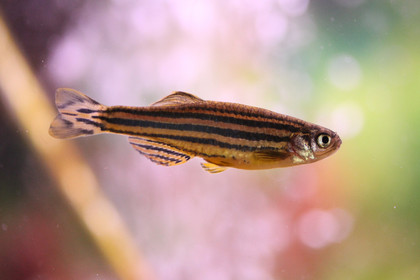
Welcome to another exciting TechRadar Week in Science. This week we've got a positive cornucopia of news, from real-life tractor beams and exoplanets, to actual mind reading, electricity-eating bugs, and magnetic battery-extending chips. Oh, and don't forget the coffee.
Star Trek gets real -- A real-life tractor beam made entirely of light was shown off on video this week. Researchers from the University of St Andrews have managed to do the seemingly impossible. A fancy mirror and lens setup created a laser-light interference pattern that essentially attracts objects to the beam. It'll work in a liquid or a vacuum too, so now all we need is a starship. [New Scientist]
Earth and the magic of Goldilocks -- We might live on Earth, but apparently our big blue marble isn't as habitable as you'd think. Using new, up-to-date data, astronomers have redefined the 'Goldilocks zone', the distance from a star at which a planet is likely to be able to sustain life. Ironically that's thrown Earth out into the 'too hot' range; we can thank the clouds for keeping us cool enough. That means loads of supposedly life-capable exoplanets aren't quite so habitable, but also previously discounted planets might be teeming with life. Now, where's that warp drive so we can actually go and find out for certain? [arXiv]
Coffee in danger -- We might be a nation of tea-drinkers, but coffee is the life-blood of many a commuter. Said coffee, especially from Costa Rica, but also other South and Central American coffee regions, is under threat. Coffee rust, caused by the fungus Hemileia vastatrix, is threatening to wipe out half the 2013-14 Costa Rican coffee crop. It's such a big problem for the country that it's rushed through legislation to help fund the fight against the pest. If you're a coffee lover, maybe it's time to switch to tea instead to get your caffeine fix? [Nature News]

It's not your fault you can't remember anything -- The older we get the more inherently forgetful we become, but it's seemingly not our fault. A recent study has shown that sleep impairment causes reduced memory formation, meaning you fail to solidify memories made during the day. It's suggested that ageing causes the deep-sleep centres of the brain to deteriorate, disrupting sleep and causing your memories to fade. So, next time you forget something, blame it on your snoring partner keeping you awake. [Scientific American]
Reading the minds of fish -- Wouldn't it be lovely to be able to read the minds of others? One day we might get there, but for now we'll have to be content with reading the minds of fish. Using the transparent zebrafish, scientists were able to see the activity of individual neurons using green fluorescent proteins. The fish was shown a dot on a screen, which moved from one side to the other. A corresponding dot, created by the firing of individual neurons, lit up within the brain of the fish and moved in time with the on-screen animation. Literally reading the minds of fish, now all we have to do is work out what they're all thinking. [New Scientist]

Electricity-eating bacteria -- You might wonder why you'd ever want bacteria that could actually eat electricity, but apparently biofuel is the answer. The bacterium Mariprofundus ferrooxydans, which normally lives on the seafloor near hydrothermal vents, usually feeds on soluble iron. Scientists have shown that the little bug will eat pure electricity instead, capturing carbon dioxide in the process. The idea is that we feed them electricity generated by solar, wind or another renewable source, and they multiply like mad, creating a new biofuel for us to power our cars and other things. Handy little electricity munchers. [Popsci]
Get daily insight, inspiration and deals in your inbox
Sign up for breaking news, reviews, opinion, top tech deals, and more.
Why stroking feels good -- Quite a lot of animals, including pretty much every furry pet, loves to be stroked. Even humans like a good petting every now and again, and that's because we all have specialised neurons that fire when we experience a particular gentle stroking. These extra sensitive neurons, C-tactile fibres, only exist in patches of skin with hair and only light up when stroked, causing a pleasant calming sensation. Scientists found that mice, for instance, actually like being stroked, and given a choice, would always go in for a good stroking. [Science]
![Different strokes [Image credit: Flickr Creative Commons]](https://cdn.mos.cms.futurecdn.net/c31a42bff9e71621a943291a0867fa7a.jpg)
Magnetic chips -- Today's microchips basically power everything and are essentially made of tiny, tiny switches called transistors. Normally these transistors are turned either on or off with electricity, but they need constant power to remain active. South Korean scientists have come up with a magnetically controlled transistor that swaps electricity for magnets, meaning they don't need constant power to operate. Although a long way off from any form of real-world production, these new magnetic chips could drastically reduce the power consumption of computers, which can only be good thing. It'd be nice if our phones lasted for more than a day on a single charge wouldn't it? [Nature]